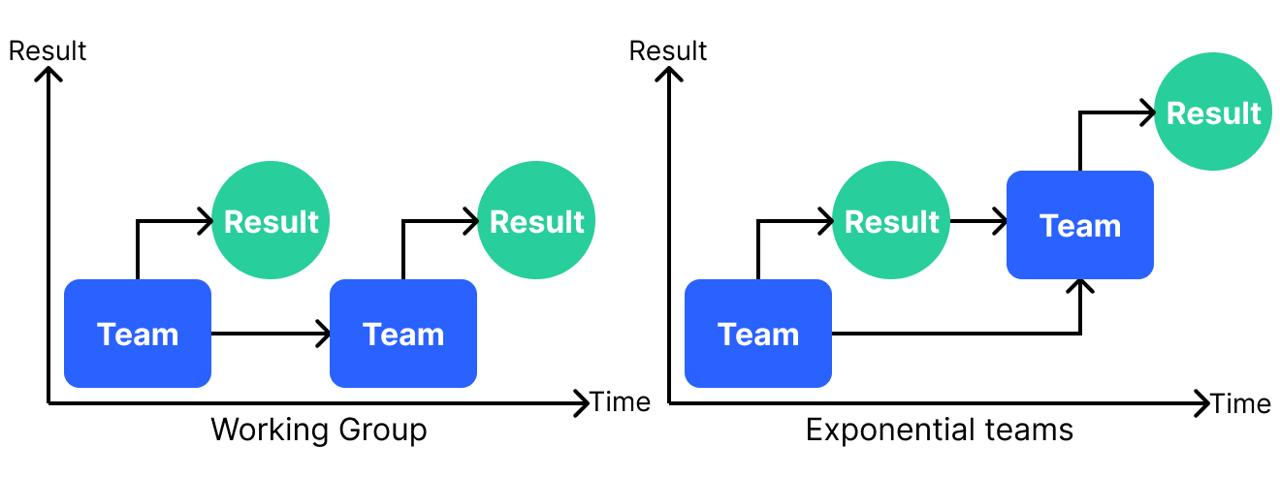You can check out the content about exponential teams by Dr. Curtis R. Carlson at the following link.
To put it simply, the exponential team is a team that maximizes team productivity by multiplying the team’s productivity by the team itself. So what is the difference between an exponential team and a normal team? To confirm this, let’s first look at the difference between a team (an exponential team) and a work group (a normal team) in business administration.
In business administration, an organization that adds itself is generally called a work group, and an organization that multiplies itself is called a team. A work group is a form in which the given work is divided into groups according to the number of people and each person does the assigned work. This type of organization does not need to cooperate with each other. On the contrary, a team is a form in which work is carried out mutually cooperatively. This cooperation within the team creates a synergy effect. This synergy effect can be called the effect of multiplying the team itself.
The book Collaborative Intelligence: Using Teams to Solve Hard Problems says that teams perform better than work groups. The book says that peer coaching is the variable that best predicts organizational performance. The correlation coefficient between this peer coaching variable and team performance was 0.82. In other words, this means that about 67% of the team’s performance can be explained by this variable. The peer coaching mentioned in this book refers to receiving help from each other in work, and the reason why teams perform better than work groups is because of peer coaching.
To improve team performance, increasing available time and reducing wasted and sleeping time is additive thinking, that is, work group behavior. Increasing the team’s collective intelligence and utilizing the collective intelligence is multiplicative thinking, that is, team (Organization) behavior. Simply increasing working hours is nothing more than increasing the workload. It is difficult to expect outstanding performance improvement through this.
So how do we create a multiplicative thinking, exponential team? We can get some hints from the theory of increasing collective intelligence presented by Douglas Engelbart.
In this theory, tasks are divided into three categories to exponentially increase collective intelligence.
Task A: The work that the organization was originally supposed to do.Task B: The work of improving Task A.Task C: The work of improving Task B.
He said through this theory, "The better we get at getting better, the better and faster we'll get better." This theory can be expressed graphically as follows.

In this theory, it is said that exponential teams have a structure that can grow further through the results of the previous stage called bootstrapping. Bootstrapping is a word that comes from the meaning of lifting the laces of one’s own shoes and jumping into the air, and it means improving the situation on one’s own without external help. If this theory is utilized well, a team that grows exponentially can be created.
To put Douglas Engelbart’s theory into practice, we might ask ourselves the following questions:
- How can we multiply rather than add?
- How can we increase the multiplication ratio?
- How can we shorten the application period of multiplication, that is, the period that produces the result?
If you can find the answer to this question, you can become a team that grows exponentially. Here, I will introduce some methods introduced in the book 함께 자라기, modified to fit the team.
- Leverage what your team already has.
- If you focus only on introducing new things (systems, methodologies, etc.) to your team, the new things can overshadow what already exists. First, check how much of the knowledge your team already has is being utilized.
- Create synergy effects by connecting the knowledge, skills, and experiences that the team already has, and make it easy to move back and forth from one area of knowledge, skills, and experiences to another.
- Bring something new into the team and try to clash with what you already have.
- Let what your team is doing now serve as a foundation for what you will do in the future.
- Collect external materials.
- If you only continue to do internal circulation, there is a risk of staying at a certain level. Periodically provide external stimulation to the team and make sure the team can quickly accept it.
- If internal conflict arises due to external stimuli, try to resolve it. Make sure that the external stimuli and the team’s assets are in a symbiotic relationship.
- Think about the process for improving your team.
- Create task B, which periodically involves looking back and reflecting on task A.
- Create task C, which considers how task B, which is about improving the team, can be improved.
- Get feedback often.
- If you have new information, it is better to do small experiments a month or a week later rather than preparing a large and perfect experiment a year later, and do this frequently to increase the turnover rate.
- Run early and often, and learn from failure.
- Gradually create tools and environments that enhance your team’s capabilities.
Legendary programmer Ward Cunningham gradually creates an environment that helps him program in an uncomfortable language where he cannot move his limbs as he pleases. If you compare the things that slow me down to gravity, Ward can be said to be gradually reducing gravity. If you reduce gravity a little, your body becomes lighter, and the task of reducing gravity becomes easier. If you repeat this, you can eventually achieve a state of near weightlessness.
- Don’t be too obsessed with having the perfect tools and environment. Perfection doesn’t exist, so you should gradually improve your tools and environment.
These efforts may not show results right away. If you do them consistently, you will see results in 1-2 years. Don’t try to see results too quickly, but wait a little longer for the results to show.
The content about exponential teams so far can also be applied to personal life. If you look back on your life and make a steady effort to improve it, your personal growth can also be exponential.
G.K. Chesterton says the growth we use is wrong.
The fatal metaphor that progress means leaving something behind and moving forward has completely obscured the real idea of growth, which is that growth means leaving something behind and growing inside us. - G.K. Chesterton
Growth is looking back on the results we have created, whether they are successes or failures, and using them as a stepping stone to move forward, and this will become the foundation for an exponential team.
An exponential team will not only bring us great results, but will also help us grow further.
Was my blog helpful? Please leave a comment at the bottom. it will be a great help to me!
App promotion
Deku.Deku created the applications with Flutter.If you have interested, please try to download them for free.



